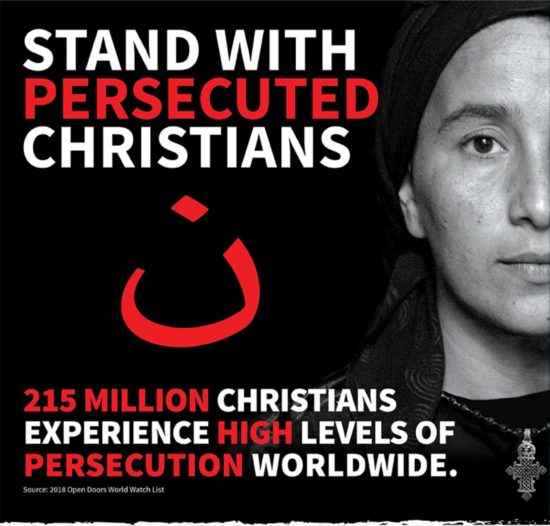
Let me kick this article off straight from the bat by stating that if you are a Christian, you have zero choices about whether or not you should stand in solidarity with the persecuted Christian. You absolutely should! Standing with persecuted Christians is, for the Christian, as obligatory as prayer! I am tragically confounded by some Christians who do not think it is their responsibility to help the persecuted Church. They feel more committed to handing over their tithe each week than they do in supporting the persecuted Church. That being said, I am going to assume for the rest of this article that you agree with my premise and want to help the confessors and martyrs of the Church.
Let’s look at a few issues. Firstly, much of the Church is now persecuted from east to west, north to south. Using the analogy of illness to represent persecution, Christians in the west are fighting off the common cold, whereas many of our brothers and sisters, mainly in the Communist, Islamic, Hindu, and Buddhist worlds, are fighting off a killer disease. Keep that perspective in mind.
The next thing to consider, which is important for your sanity (at least it was for mine), is that not one person is responsible for fixing the entire problem. It is only our responsibility to do what we can when we can and how we can! Perhaps the following matrix will help you find your level of commitment.
Before anything else, the first thing that has to change is our political narrative. Specifically, Christians need to rediscover Christian solidarity with one another – as primary to how we engage with the society around us. For example, honouring of the saints who give their lives for Christ’s sake, whom we call martyrs, and those who suffer for Christ’s sake, whom we call confessors. We need to rally around such individuals and their communities: politically, socially, economically, and spiritually. The way we speak of and about them and in our customs and traditions – we must remember them. They need to find their way into the very heart of our discipleship. Our martyrs and confessors around the world should be the central theme of our walk with the Lord Jesus. This should be imprinted on all we do and the choices we make. Assuming you’ve got this already or are working on it, may you now discover how you can help?
This issue of issues can be addressed at many levels: an individual level, a group level, group cluster level, national level, and international level. So, I am going to go through these levels of engagement and throw in some ideas about what each level looks like. Perhaps this will help you find a way forward from the despair we share over the plight of our brothers and sisters and the response you feel you can give to it! My examples should be read as cascading one into another and are not a complete list, but a mere drop in the ocean. So, the list is a starting point or a gate into a way of thinking about the issue.
Individual Level: Christians talk as if prayer is the most important thing we can do for the persecuted Church. I want to challenge this mindset. Prayers change you, but you change the world. The most important thing we can do as an individual is to talk about the persecuted Church. I mean it, seriously! Engage everyone we know on the issue. Throw it in the face of our enemies, make it a ‘did you know’ conversation among our friends, mention it in every political conversation. Mention it in our churches and bible studies – bring it up whenever we can! The silence of the Church is what allows persecution to go on. Our aim should be to bring people on board, even those who are not Christians, on the issue. We can also give money to the many charities that support persecuted Christians. And yes, we can pray!
Group Level: Perhaps you know a bunch of Christians and people of goodwill who want to do more than the individual stuff. Then, why not form a ‘cell of solidarity‘ for the persecuted Church. This can be an activist group that leaflets the local city centre, gets involved at the local level with a national initiative on the issue, visits a fellowship of the persecuted church, joins in protests, encourages one another, raises funds in the street – to be forwarded to the persecuted Church. I mean, truthfully, such groups are only limited by their imagination, determination, courage, and leadership. Such a group could volunteer with one of the existing charities, working in this area and among all the fellowships of the city, to rally them to the plight of the persecuted Church.
Group Cluster Level: Perhaps your group comes across another group with a similar ‘cell of solidarity’ – well, now we are talking, huh? Why not start getting involved in the local hustings at election time, asking challenging questions to politicians, organising local campaigns of people streaming in to see their MP, to give them a fist-thumping lecture about why they need to be more vocal about the persecuted Church. Coordinate so that it happens every single week – 52 weeks a year with a bunch of letters to boot! Why not organise marches – the aim being to draw people’s attention and sympathy to the persecuted Church? Why not organise a solidarity festival? Why not support one or two of your clusters to go out and help the persecuted Church practically, with the skills you have to offer – whatever they may be.
National Level: For this example, my eyes turn towards countries more like Hungary, or the Vatican, or even possibly Russia or Poland, rather than the UK. However, if a nation adopts a serious commitment to the persecuted Church (because they are an unashamed Christian nation), then the national policy could be affected. Christians could be given first preference for foreign aid, governments could be pressured to intervene militarily on behalf of the persecuted Church, governments could provide legal protection for Christians, or house an international militia within their borders that could then intervene in a conflict zone for the persecuted Christians, acting under the sanction of the nation-state, under the auspices of a government, or as part of some force to uphold some resolution pushed through the UN.
A national network of ‘cells of solidarity’ could help bring the persecuted Church to the heart of the rhythm of life of every fellowship in the land, not as some kind of Church in its own right (GOD forbid), but rather as the sinews and tissue that binds all Christian fellowships together in a common cause. It could help to pull together some national events or draw people into some that already exist. From this could form a voting block that pushed the issue of the persecuted Church into the centre of not just ‘church politics’ but also national politics.
International Level: Campaigns can pressure bodies like the UN and EU to take a more robust stance on behalf of the persecuted Church. Trade deals, aid, and defence pacts could all be coloured by the issue. Christian nations could unite in a confederacy committed to the defence and alleviation of all Christians around the world. International cells could coordinate to send resources and personal information to where it is needed – acting as a giant collective of activists, united and supported by the fellowship of the Churches.
Now – I am a dreamer, but you know, before the Ancien Régime fell in France – and then in Europe, someone had to dream of doing things differently; and that started by someone putting pen to paper. Those being the enlightenment thinkers, that being the French revolution and voila we have the modern world. So do not be hasty to judge my dream; because ideas have a way of catching on and inspiring people. People need to organise their lives around an idea, and this is as good as any for a Christian. The problem within the Church currently is that we lack enough leaders with big enough visions. Too many Christians are content to treat the persecuted Church as a tick box. It’s reduced to something they do once a year, done as part of a complete programme for their Sunday club-style church, rather than see the persecuted Church as central to what they do as a Christian fellowship. This, I contend, has to change! Too many of the charities helping the persecuted Church are content to only deal with the symptoms and not the cause of the problem – they do not want to see the end of Islam, or communism, or the Hindutva, or the military junta in Burma. They are not working towards that – they are instead only wanting to put a plaster on the gaping wound of the body of Christ! Until we commit ourselves to a more radical ambition – we will not see anything change. For those whose mind jumps to saying, “It has to be this way – our Lord said it would be.” I say, “Yes! You are right, but our response does not have to be so pathetic, lacklustre, or muted!”
Our response to the plight of persecuted Christians is limited by our imagination, determination, courage, and ability to organise! Christians must organise, train, mobilise, and resist! The ‘Polite dinner party, the comfy mattress is our GOD, gushy lovey, Christianity’ is hip – but is not helping anyone – and it’s time we accept that! We need to have a theology of martyrdom and solidarity among Christians with those in the house of faith, not other groups. A serious Christianity will be taken seriously – and people will be drawn to that solidity among us if it reaches a sufficient mass! The gimmicks of so many of our fellowships show that we have not taken hold of some serious issues we can get our teeth into. This issue of all issues is serious and can unite Christians across denominations.
So, do not wait for permission! Start by getting involved as an individual and work your way up the matrix as far as you can go! This matrix can be applied any way – but it is assuming a western liberal democratic context, for the most part, so bear that in mind if you are reading this from somewhere that does not enjoy the ‘freedoms’ we enjoy here in the ‘western world.’

